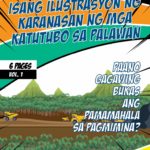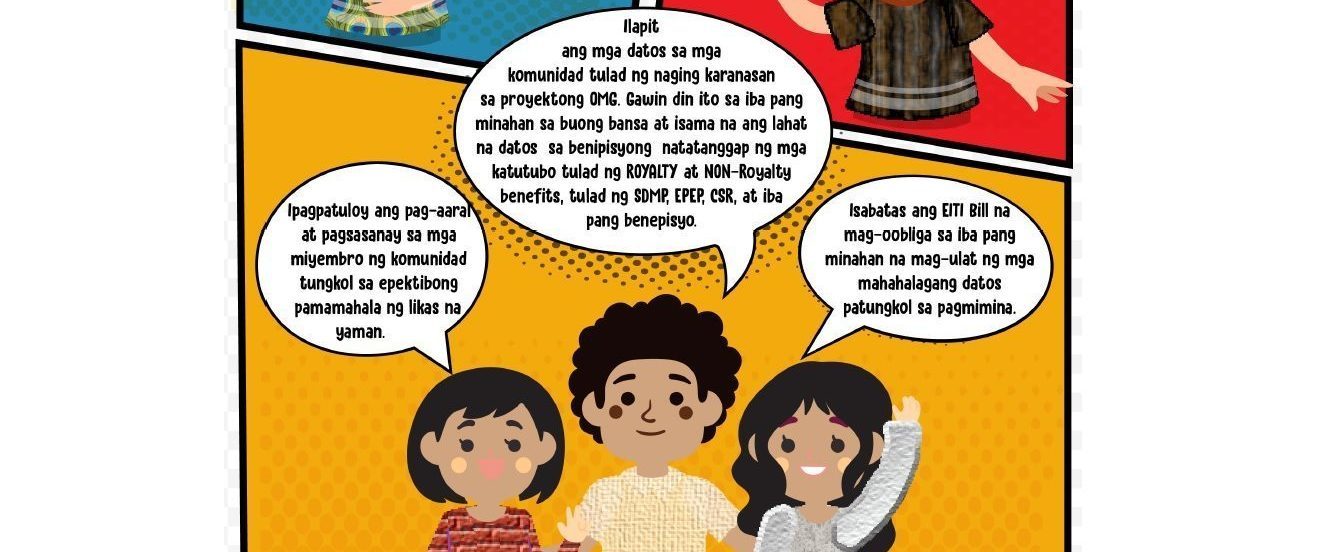Comics as a tool to explain mining concepts to IP communities
By Adelle Chua
When indigenous peoples (IPs) have no information on the mining activity going on in their community, they are unable to hold others accountable for the use of their resources. They are denied the benefits of the mining activity even as they face major disruptions to their way of life and their environment. To address this, one organization has tried to explain the concepts of open data and mining governance to a community that hosts mining operations in Palawan province in the Philippines.
Through a partnership with Hivos Southeast Asia, Bantay Kita – a coalition of civil society organizations advocating transparency and accountability in the extractive industry – has come up with a six-page illustration that attempts to explain mining concepts to community members.
The comics – entitled Isang Ilustrasyon ng Karanasan ng mga Katutubo sa Palawan: Paano Gagawing Bukas ang Pamamahala sa Pagmimina? (An Illustration of Palawan IP Experience: How to Make Mining Governance Open?) – drive home one main point: That full and accurate information about mining operations should be available to anyone and everyone.
Various comics characters discuss open data and mining royalty in the six-page visual with simple dialog.
Open data helps build transparency and trust, and ensures that the benefits of an area’s natural resources redound to their rightful recipients.
Meanwhile, the law that states IPs must be paid mining royalties of not lower than 1% of the total value of the gross output. The royalties are supposed to be managed by registered indigenous people’s organizations (IPOs) that are required to release annual audited financial statements. It is the task of the National Commission on Indigenous Peoples (NCIP) to monitor these royalties, as well as to monitor the projects and programs of the IPOs using these royalties.
Drawing from a previous engagement in Bataraza, Palawan, the illustrations cite three possible issues that may cause confusion among communities if not addressed properly.
- First, discrepancies may come from the fact that royalty amounts are reported differently: Some annually, others quarterly. It is important that communities clarify not only the amount but also the period covered by the royalties.
- Second, there could be limited access to information. There might be full and accurate information available, but the data may only be with IPO officers who are not able to cascade them to community members.
- Third, mining royalties are taxable by 20%, according to the Tax Code of the Philippines. People should be aware that what is reported by the Philippine Extractive Industries Transparency Initiative (PH-EITI) does not yet include tax deductions.
The explainers offer suggestions for community members to be more informed about mining activities in their area.
- Refer to EITI reports.
- Avail themselves of education and training provided by various groups.
- Bring data – royalty and non-royalty issues alike – to as many members of the community.
- Finally, advocate the passage of the Extractive Industries Transparency Initiative (EITI) bill which would require all mines to report their data.
The comics advises the community that information regarding royalty can be obtained from numerous sources: from the peoples’ organizations, from the mining company itself, from the National Commission on Indigenous peoples, from the Mining and Geosciences Bureau of the Department of Environment and Natural Resources, or from the PH-EITI.
Mining information need not be restricted to those who lead, or those who can understand. Every member of the community is valuable, must be consulted, and must be helped to understand. And indeed, the people of Narra town in Palawan appreciate the illustrations; they have been able to make more sense of the mining information they receive.

Title : Isang Ilustrasyon ng Karanasan ng mga Katutubo sa Palawan: Paano Gagawing Bukas ang Pamamahala sa Pagmimina?
Date : 2020
Writer(s) : Bantay Kita
Type : pdf
DOWNLOAD





